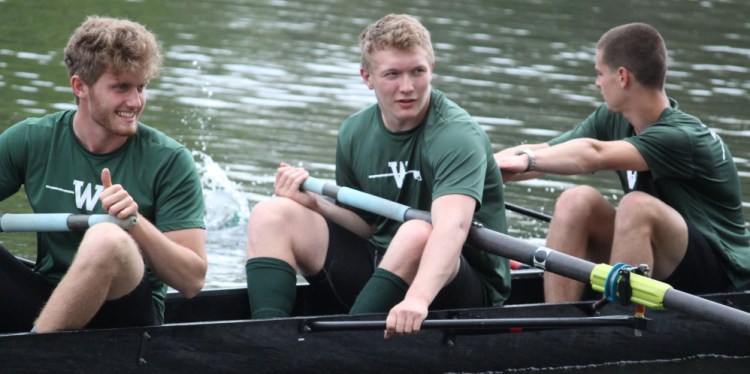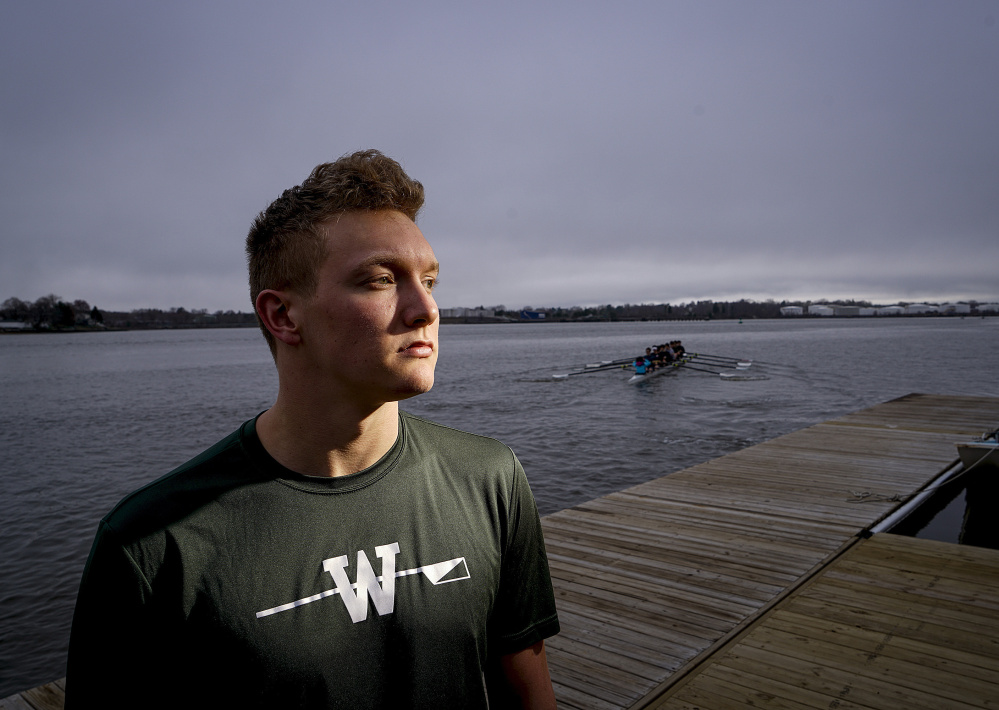Portland High senior Charlie Lyall, a center on two Class AA state championship teams, had long thought of himself as a basketball player.
That was until last spring, when he began pulling an oar instead of pulling down rebounds. Lyall has adapted to rowing so quickly that he plans to compete in college for a national powerhouse – the University of Washington.
Lyall started rowing with the crew at Portland’s Waynflete School. Last summer, he took part in a competitive training camp with Community Rowing, Inc. in Boston. Before long, he took five paid, official recruiting trips to schools with top collegiate rowing programs.
“I’ve almost fallen in love with the fun aspects of it, being on the water, working out with friends,” Lyall said of rowing. “Now I want to succeed at it. I want to push myself to be the fastest that I can be and to see if I can realize the potential that people are telling me I have.”
Lyall, 18, is a 6-foot-4-1/2, 225-pound recruited walk-on for Washington. Finding a spot in the lineup will be difficult but not unprecedented at a renowned program with a deep history.
“Development is a cornerstone of Washington rowing,” said Matt Rung, the men’s assistant coach and recruiting coordinator. “Every year there are five, six walk-on guys who do very well.”
The legacy of the program was popularized by David James Brown’s book, “The Boys in the Boat,” a nonfiction bestseller in 2014. It tells the story of the University of Washington team that represented the U.S. and won a gold medal at the 1936 Berlin Olympics, beating the favored Germans in front of Adolf Hitler.
More recently, Washington won an unprecedented five straight Varsity Eight national titles from 2011-15 and nine straight overall points championships (2007-15) at the Intercollegiate Rowing Association championships, an event first held in 1895.
“Washington clearly sees something in Charlie that they like,” said Waynflete crew coach C.C. Stockly. “Basically, I’ve thrown him off the dock, and the minute he hits the water at Washington, he has to start swimming.”
Lyall’s progress has been stalled by strained ligaments in his pinkie finger, which he damaged while blocking a shot in a basketball game against Deering on Feb. 3. He played through the injury in Portland’s final five games, but gripping an oar aggravated the injury. He does not plan to row until he goes to a training camp in Washington shortly after high school graduation.
Rung says he evaluates recruits in three main areas: Their physiology and ability to produce power, their personality, and their academic credentials. Lyall was Portland High’s choice for the Phi Beta Kappa Academic Achievement Award after his junior year.
“He did have rowing experience and sent us some video. I have an eye for this and I thought his profile looked strong,” said Rung. “And, he’s a competitor. They guy just won another state championship (in basketball). We watched some of those games, too. I watched how he moved on the court. He’s clearly a very athletic and driven guy, and I think that will serve him well.
“Plus, he’s a really, really good student. I mean, really good,” Rung added. “The broad parameters, he really hit all of them.”
HE NEEDED A NUDGE
Lyall’s parents, David Lyall and Blanche Belliveau, had encouraged Charlie to try rowing for several years. Stockly, the crew coach, knew him well because Lyall attended Waynflete from kindergarten through ninth grade.
Lyall kept resisting because he “was wrapped up in AAU basketball,” with the goal of playing in college.
Shortly after Portland beat South Portland in a double-overtime championship game in 2016, Lyall realized his basketball future looked like being “a sixth man/bench player on a pretty goodish D-III team. And those weren’t really the kind of schools I wanted to go to.”
With one final nudge from his mother – “she just signed me up” – Lyall joined the Waynflete crew team, a co-ed club program that is open to students from other schools. This spring, Waynflete has 58 crew members representing eight high schools.
“He didn’t want to do it, thought he’d hate it and would end up quitting,” Belliveau said. “Within two weeks, he loved it. ‘I’m a crew guy now,’ he said.”
Lyall flashed his potential two weeks into his first season when he turned in a 2-kilometer ergometer (dry-land rowing machine) time of 6 minutes, 40.6 seconds. It was the fastest among all first-year rowers at the annual preseason competition for high school-aged rowing clubs in Maine. Lyall said most Division I recruits are in the 6:20-6:25 range, but “for my first-ever 2K it was good.”
“It’s at that point you look at a kid and think, ‘he could go somewhere with this,'” Stockly said.
Before the season was finished, Lyall had been elected a team captain and began seriously considering rowing in college. After completing the summer program on the Charles River with Community Rowing Inc., he contacted college coaches.
That led to five official paid recruiting visits. The first four were to the University of California, Cornell, Columbia and Wisconsin. Lyall’s top choice was Cal.
Then he visited Cal’s archrival.
Viewing a roomful of Olympic medals inside Washington’s historic Conibear Shellhouse started to sway him. By the time Lyall finished watching a training session from the coaches’ launch on Lake Washington, he was hooked.
“We got out on the water and there was Mt. Rainier on one side and the Cascade Mountains on the other, and they had all the (eight-man boats) lined up and were doing short race-distance pieces,” Lyall said. “It was just an amazing thing to see, the amount of competition and the excitement they took in trying to get better.”
At this spring’s grudge match with 2016 national champ Cal, Washington’s varsity eight had five international rowers from four countries.
But a crew team consists of more than one boat. At many regattas, there are races for second and third varsity eights, a freshman eight, and a coxed varsity four.
“The team is a lot of walk-ons,” Lyall said. “They love multi-sport athletes who picked up rowing later in high school and maybe even in college. They take pride in developing people.
“That’s part of the reason I picked them and, I think, they picked me,” Lyall said. “I don’t have a lot of experience at all, and I think I’m going to need extra attention. I mean, my coach here is phenomenal and she’s taught me a lot, but I just haven’t been rowing that long.”
RICH HISTORY
Crew is a club sport at the high school level in Maine. Last year, four clubs participated in the seventh annual Maine Youth Rowing Association championships: Waynflete, Yarmouth Rowing Club, Berwick Academy and Megunticook Crew from Camden. Waynflete and Yarmouth have always welcomed rowers from other high schools.
And a select few rowers from Maine have achieved at the highest level.
Ellie Logan of Boothbay Harbor, who competed for Stanford University, became the first American woman to win three Olympic gold medals in rowing as part of the women’s eight in the 2008, 2012 and 2016 Games. Anna Goodale of Camden (2008) and Holly Metcalf of Woolwich (1984) were also Olympic gold medalists in the women’s eight.
Wyatt Allen of Portland won gold in the men’s heavyweight eight at the 2004 Olympics and bronze in 2008. At Portland High, Allen played soccer and lacrosse. He had never rowed until a coach spotted him in a cafeteria line at the University of Virginia and told him to get down to the dock.
Allen is now the heavyweight men’s crew coach at Dartmouth. He also recruited Lyall.
“As a coach, you’re still always looking for big, athletic guys,” Allen said. “When you look at American high schoolers, the top athletes aren’t rowing at the junior level in most cases. So you have all these great athletes walking around and they might not be good enough to play Division I basketball, but they’re talented, gifted athletes, and our sport is one you can pick up pretty late and do at a high level.”
The influx of international rowers at top programs over the past 20 years makes it more difficult for a walk-on to succeed, Allen said. But it can and does still happen. Dartmouth’s varsity eight stroke, senior Spencer Furey, was a tennis player who switched to rowing in college. Furey cracked Dartmouth’s varsity eight as a junior, and this summer will train with the national team.
“You have to be competitive enough to keep grinding away but patient enough to develop,” Allen said.
“I’m expecting to have a really big learning curve,” Lyall said. “I’m going to push myself as hard as I can, but realistically, freshman year might not be in the cards for me. I’m just going to keep pushing myself, and the goal is to try to make some of the higher ranking boats by junior or senior year.”
Send questions/comments to the editors.





Success. Please wait for the page to reload. If the page does not reload within 5 seconds, please refresh the page.
Enter your email and password to access comments.
Hi, to comment on stories you must . This profile is in addition to your subscription and website login.
Already have a commenting profile? .
Invalid username/password.
Please check your email to confirm and complete your registration.
Only subscribers are eligible to post comments. Please subscribe or login first for digital access. Here’s why.
Use the form below to reset your password. When you've submitted your account email, we will send an email with a reset code.